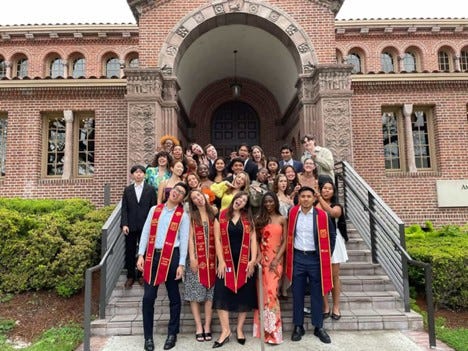Student Perspectives: What I Wish I Knew When I Was Applying
It’s been a couple of years since I submitted my application to USC. However, I can still recall the mixed emotions of excitement, fear, self-doubt, and anticipation that I experienced during the admission process. Throughout high school, USC was one of my dream universities, yet I hadn't known anyone who had been accepted. Despite my research and campus tours, I felt like there were so many unknowns when I was applying. Looking back, I wish I could tell the younger me about what the admission process is actually like, so that I wouldn’t have been so worried. Even though it’s natural to experience feelings of anxiety and stress when it comes to completing such a big step in your education, I want to take this opportunity to give you as many insights as possible so that I can take a little bit of that weight off your shoulders.
Hello everyone! My name is Makenna Harding-Davis, and I am a rising junior majoring in Music Composition. I am also double minoring in Music Production and Nonprofits, Philanthropy, and Volunteerism. In this article, I am going to use what I’ve learned from the past few years of working in the Admissions Center to write out everything I wish I knew when I was applying to USC.
Don’t let the numbers dissuade you
Deciding to apply to a university can sometimes be the most daunting step in the admissions process. I can remember seeing the acceptance rate of USC and instantly feeling like there was no way I could get in, and wondering why I should even apply. I experienced the same feeling when I saw the USC’s sticker price, and I genuinely had no idea how I would finance my education at such a steep rate. I brought my concerns to my high school guidance counselor, and what she told me changed my perspective on the entire admissions process. She told me never to let the numbers dictate where I choose to apply, because you never know if you are precisely the person a school is looking to admit. If you never try, there is no way of knowing, and if you genuinely want to go somewhere, you can’t let the fear of being rejected stop you from giving it your best shot. The same goes for the cost of tuition. Perhaps you are the perfect candidate to receive a merit scholarship, or maybe your financial aid package will be different from what you expected. Although these numbers and percentages can seem very important when you are reading them in an admission pamphlet, they don’t give you the context of all the human effort that goes into reading your application; so if you have the means to apply, you might as well try (and if applying is a financial burden, you can request a fee waiver).
The Holistic Review Process
One of the biggest fears I had when applying was that I hadn’t taken enough AP classes in high school. I spent my summer before senior year watching YouTube videos of people talking about their college application “stats:” their GPA, how many AP classes they took, their extracurriculars, etc. Many of them had four or more classes, but I had only taken one. My small high school taught a few honors courses and AP Calculus AB, so there were only a few “high-level” classes I could take, and I couldn’t help but worry that the instant an admission counselor saw that was all I’d done, they would drop my application into the “do not admit” pile.
It turns out that the admission counselors take the context of what courses your school offers, along with many other factors, into consideration when they are reviewing your application. So, instead of seeing that I only took one AP class and a few honors courses, my admission counselor knew that I took advantage of all the challenging classes and academic opportunities available to me at my school. Just like your GPA doesn’t define who you are as a student, it will not determine your admission decision. Admissions officers will review every aspect of your application to gain a comprehensive understanding of who you are before making a decision. Therefore, it’s essential to embrace every part of your application, as it tells your story.
Be YOU
As I mentioned before, what the admission counselors are looking for is the whole you. The numbers on your application only tell them so much, so it’s essential to use your personal statement
and short answer(s) to show what makes you special. When I was approaching writing my essays, I was initially hesitant to be open and vulnerable. There was a part of me that felt I needed to portray the perfect student and hide my missteps and imperfections. However, it wouldn’t have been authentic of me not to share the lessons I had learned from past experiences, even the negative ones, because they are what shaped me into the person I am today. Instead of wanting my essays to sound like they could be published in an academic journal, I focused on making them sound like my own voice, which made it easier for me to write expressively. In the end, I felt like my essays told the story that an admissions counselor couldn’t find in my GPA, my classes, and my extracurriculars.
Ask for help
The longer you spend working on your application, the harder it can be to have a clear perspective on the quality of your work. This happened to me, and I can remember spending so much time editing and rewriting my “Why USC” short answer that I was convinced it wasn’t good enough. However, I asked one of my high school teachers to review it, and their feedback was that it was really good. Sometimes, all it takes is a second pair of eyes to give you the confidence you need to feel good about clicking submit. Another tactic I use to help myself change my perspective on my writing is to stop working for a couple of days and then read it through after some time has passed. Getting to separate yourself from your work can allow you to look at it more objectively, which is very useful when you are dealing with personal information.
In conclusion, the journey of applying to USC, or any university, is filled with challenges and uncertainties; but, it’s also an opportunity for growth and self-discovery. If I could go back and tell the younger version of myself anything, it would be to remember that the admission process is not just about numbers or statistics; it's about showcasing who you are as an individual. By embracing your unique experiences, asking for help when needed and maintaining confidence in your abilities, you can navigate this process with greater ease. Trust in your story and the effort you've put into your application. Ultimately, if you approach it with authenticity and passion, you'll be putting your best foot forward. Good luck, and know that you're not alone in this journey!




